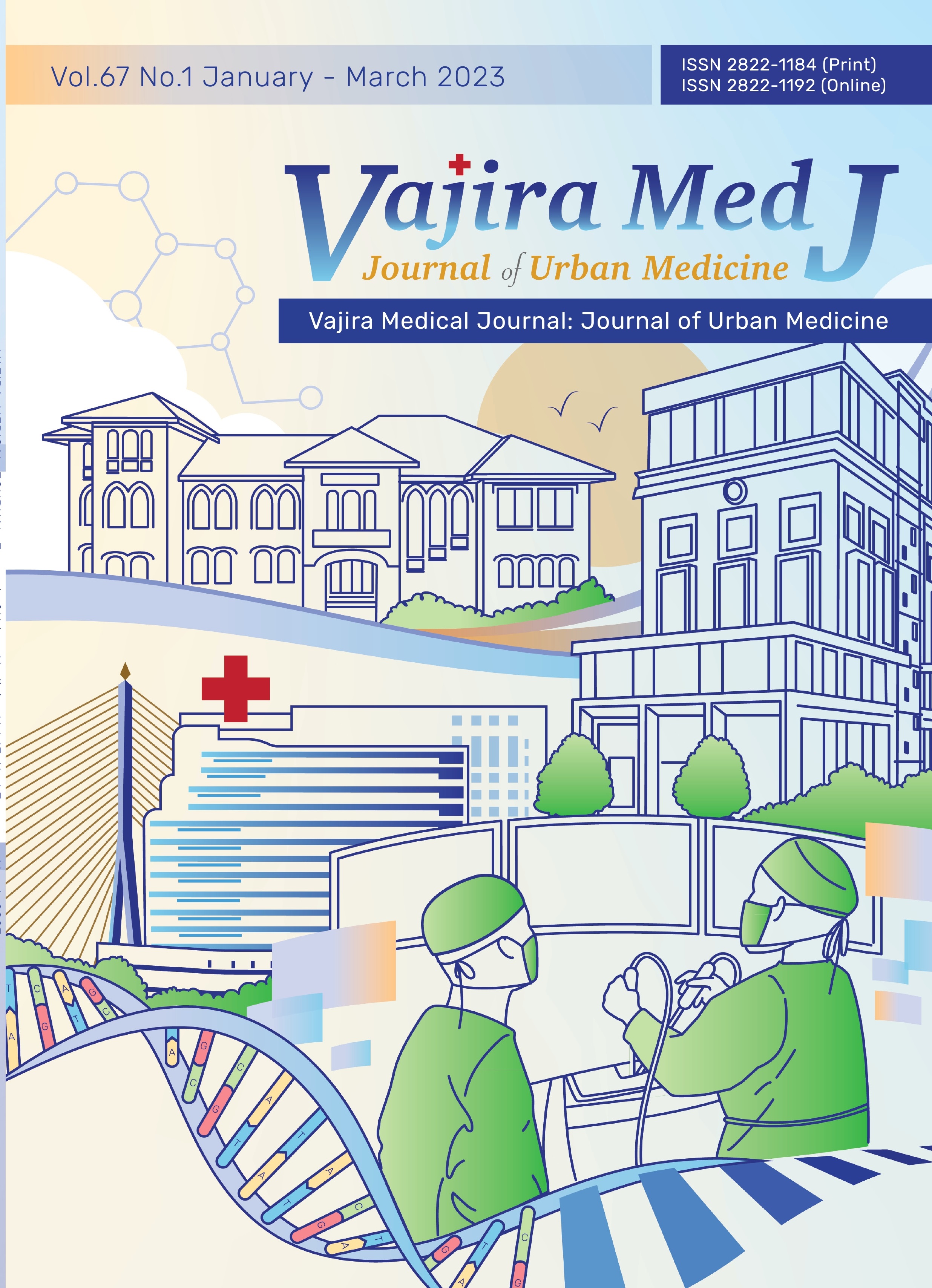Remote Ischemic Preconditioning to Prevent Contrast-Associated Kidney Injury in Elective Coronary Angiogram: A Randomized Controlled Trial RIPC prevents contrast-associated AKI
Main Article Content
Abstract
OBJECTIVE: Remote ischemic preconditioning (RIPC) is a new strategy to prevent organ injury from oxidative stress and ischemic reperfusion injury, particularly for the kidney, heart, and brain. Contrast-associated acute kidney injury(CA-AKI) is a complication of coronary angiography (CAG). Based on previous studies, whether RIPC prevents CA-AKI post-CAG remains unclear. Therefore, this study aims to compare the efficacy of standard (std) management and standard management with RIPC to prevent CA-AKI post-CAG.
METHODS: This study was an open-label 1:1 randomized controlled trial. The elective CAG patients with an estimated glomerular filtration rate of 15–45 mL/min/1.73 m2 were enrolled. For the RIPC group, patients performed RIPC starting from inflating manual cuff pressure to 200 mmHg for 5 min on an extremity and then deflating 5 min alternate to four times before coronary angiogram at least 1 hr. All patients had received the usual standard management of pre-CAG. The AKI outcomes were evaluated at 48 hrs and 1 week post-CAG. The adverse events were also assessed.
RESULTS: A total of 27 patients (RIPC group = 14, std group = 13) were enrolled in this study. Baseline characteristics were comparable between both groups except for male gender was higher in the RIPC group (std group 7 [53.85%] and RIPC group 11 [78.57%]), in part of the amount of contrast media volume and procedure duration was higher in the std group (mean contrast volume are 140 [120] mL in the std group and 40.00 [31.25] mL in the RIPC group). No AKI event was observed in the RIPC group. By contrast, AKI in the std group at 48 hrs included two (15.4%) participants and one (7.7%) participant at 1 week. Serious adverse events were not observed in both groups.
CONCLUSION: RIPC may be implemented as a systematic strategy to prevent CA-AKI post-CAG. Some researchers tend to improve CA-AKI. Further studies in a larger number of participants may verify the benefit of RIPC and provide definite conclusion.
Downloads
Article Details

This work is licensed under a Creative Commons Attribution-NonCommercial-NoDerivatives 4.0 International License.
References
Mardani S, Nasri P, Tavakoli M. Contrast induced nephropathy; recent findings. J Nephropharmacol 2013;2(2):27-30.
Kidney Disease: Improving Global Outcomes (KDIGO) Acute Kidney Injury Work Group. KDIGO clinical practice guideline for acute kidney injury. Kidney inter 2012;Suppl 2: 1-138.
Abdalla MA, Ahmed KO, Yousef BA. Incidence and risk factors of contrast-induced acute kidney injury in Sudanese patients undergoing coronary angiography: a descriptive prospective study. Cureus 2022;14(2):e21876.
Wu MY, Lo WC, Wu YC, Lin TC, Lin CH, Wu MS, et al. The incidence of contrastinduced nephropathy and the need of dialysis in patients receiving angiography: a systematic review and meta-analysis. Front Med (Lausanne) 2022;9:862534.
Koch C, Chaudru S, Lederlin M, Jaquinandi V, Kaladji A, Mahe G. Remote ischemic preconditioning and contrast-induced nephropathy: a systematic review. Ann Vasc Surg 2016;32:176-87.
Wu YN, Yu H, Zhu XH, Yuan HJ, Kang Y, Jiao JJ, et al. Noninvasive delayed limb ischemic preconditioning attenuates myocardial ischemia-reperfusion injury in rats by a mitochondrial K(ATP) channeldependent mechanism. Physiol Res 2011; 60(2):271-9.
Igarashi G, Iino K, Watanabe H, Ito H. Remote ischemic pre-conditioning alleviates contrastinduced acute kidney injury in patients with moderate chronic kidney disease. Circ J 2013;77(12):3037-44.
Mehran R, Aymong ED, Nikolsky E, Lasic Z, Iakovou I, Fahy M, et al. A simple risk score for prediction of contrast-induced nephropathy after percutaneous coronary intervention: development and initial validation. J Am Coll Cardiol 2004;44(7): 1393-9.
Hsu RK, Hsu CY. The role of acute kidney injury in chronic kidney disease. Semin Nephrol 2016;36(4):283-92.
Weisbord SD, Gallagher M, Jneid H, Garcia S, Cass A, Thwin SS, et al. Outcomes after angiography with sodium bicarbonate and acetylcysteine. N Engl J Med 2018;378(7): 603-14.
Lau JK, Pennings GJ, Yong A, Kritharides L. Cardiac remote ischaemic preconditioning: mechanistic and clinical considerations. Heart Lung Circ 2017;26(6):545-53.
Ma H, Huang X, Li Q, Guan Y, Yuan F, Zhang Y. ATP-dependent potassium channels and mitochondrial permeability transition pores play roles in the cardioprotection of theaflavin in young rat. J Physiol Sci 2011; 61(4):337-42.
Menting TP, Sterenborg TB, de Waal Y, Donders R, Wever KE, Lemson MS, et al. Remote ischemic preconditioning to reduce contrast-induced nephropathy: a randomized controlled trial. Eur J Vasc Endovasc Surg 2015;50(4):527-32.
Er F, Nia AM, Dopp H, Hellmich M, Dahlem KM, Caglayan E, et al. Ischemic preconditioning for prevention of contrast medium-induced nephropathy: randomized pilot RenPro Trial (Renal Protection Trial). Circulation 2012; 126(3):296-303.
Wang H, Chow S-C. Sample size calculation for comparing proportions [internet]. 2007 [cite 2020 Jan 20]. Available from: https://doi.org/10.1002/9780471462422.eoct005Suntavaruk P, et al. 488 Vajira Med J 2023; 67(1) Jan-Mar: 481-488
Yamanaka T, Kawai Y, Miyoshi T, Mima T, Takagaki K, Tsukuda S, et al. Remote ischemic preconditioning reduces contrast-induced acute kidney injury in patients with STelevation myocardial infarction: a randomized controlled trial. Int J Cardiol 2015;178:136-41.
WMA Declaration of Helsinki-Ethical Principles for Medical Research Involving Human Subjects [internet]. 2022 [cited 2023 Jan 5]. Available from:https://www.wma.net/policies-post/wma-declaration-of-helsinkiethical-principles-for medical-researchinvolving-human-subjects/


